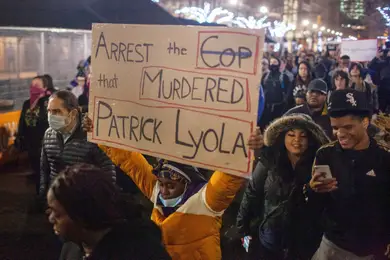Health Equity in the Context of Police Brutality in Grand Rapids, MI

Patrick Lyoya's murder at the hands of Grand Rapids police earlier this year illustrates the need for law enforcement reform. To understand what needs to change, we must first understand the historical context of the issue at hand.
The social determinants of health are the avenues through which whole communities experience trauma. Poor health outcomes today result from unjust social determinants of yesterday, and of today. Our country was built on the backs of slaves. Its institutions were formed around racism, and communities of color were and to continue to be traumatized as a result. Health equity involves both health disparity harm reduction AND harmful institution dismantlement. Communities of color cannot access their full potential while continuing to be oppressed by our institutions.
Looking towards our own community in Kent County, the harm associated with racist institutions was made presciently clear with the murder of Patrick Lyoya by a member of the Grand Rapids Police Department. This tragedy is sadly one of many, many injustices where an unarmed black individual experienced violence by police. NAACP's The Origins of Modern Day Policing states that the police force as an institution has its roots in historical era slave patrols. Slave patrols were created in the 1700 as a means to stop slave uprisings, with the ability to "pursue, apprehend, and return" runaway slaves to their owners. Tactics included the use of excessive force to control and produce desired slave behavior. After the Civil War, slave patrols were transformed into militia groups with the goal of blocking equal rights access for freed slaves. Moving forward, police departments were created out of the militia groups in order to enforce Jim Crow laws (among others), using brutality against blacks as their main tool.
The abolishment of Jim Crow laws was a huge step forward for our nation. Sadly, the very structure of the police force that perpetuates racism and brutality towards black Americans today remains. Historical context is important, and the modern criminal justice system continues to be shaped by its horrifically racist roots. The black community continues to be targeted and bias runs unchecked. Our local police force here in Grand Rapids has had numerous racial bias complaints in the five years before Patrick Lyoya was killed.
According to the 2020 Kent County Community Health Needs Assessment, and the census, black Grand Rapidsians make up over 18% of the city's population. This population faces concerning inequities in the county - they earn $52 for every $100 earned by whites, they are 3x more likely to be unemployed, 45% less likely to own their own homes, and are at a significantly higher risk of developing chronic illnesses like cardiovascular disease. Black residents in the county also report higher levels of stress in comparison to their white counterparts. The negative health impacts of chronic stress have been well-documented.
Using a health equity lens to consider the health disparities of our black community involves looking at root causes. Black over-policing is just one of many, many complex causes of poorer health among blacks. Every time an unarmed black man is brutally murdered by a cop, the mental health of the community as a whole takes a hit. These are new stressors being added onto unhealed old stressors in the community. Using the strategies outlined in the HHS action plan to heal black health disparities is like putting a Band-Aid on a deep-festering wound. It may help to some extent. But much more work and compassion is needed to clean and heal the wound underneath.
That work involves dismantling the very bones of the police force here in Grand Rapids - better yet, the institution as a whole. Defunding the police is likely the most effective way to address the problem, but realistically, it will not have enough support to pass. A more realistic measure is to pass legislation that puts an end to traffic stops for minor traffic violations. Data shows that blacks are stopped for minor road violations at a significantly higher rate than whites. These stops do little to fight serious crime or promote safety in the community, but do pose significant risk of escalation to violence. Over 1000 people are shot and killed by cops every year. Of those, more than 400 are motorists carrying no weapons, and who are not being pursued for a violent crime. That is more than one per week.
Banning certain kinds of minor motor violation stops is not a new idea. Los Angeles recently implemented this rule, as well as Portland, and recently, Lansing. Police oftentimes pull over black drivers for trivial violations like expired tags, in order to search for drugs or a weapon. Limiting those types of stops will reduce the power that racist cops can wield over black individuals; power that continues to lead to violence, brutality, and the tragic murder of our black neighbors. Power which causes chronic stress, which is one of many root causes to health disparities in the black community.
Health equity as a goal will invariably involve every sector of society. Root causes are complex and will subsequently require complex interventions to reverse. This is worthwhile work. Health is shaped by our environment; as such, we must re-shape the environment ethically, in a manner which makes access to good health easy for all individuals and communities. All policy must follow the basic ethical principles for health: Respect for Persons, Beneficence, and Justice. Removing the unjust power that the police have to pull over and murder our black neighbors is an absolutely vital change to public policy here in Kent County. This policy change is the least we could do in reparations to Patrick Lyoya's family. It is a significant step towards the HHS plan's goal to advance the health, safety, and well-being of all American people.